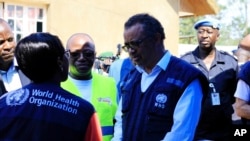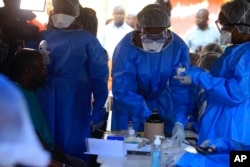World Health Organization chief, Tedros Adhanom Ghebreyesus, says the raging conflict in North Kivu makes the Ebola outbreak in eastern Democratic Republic of Congo extremely challenging and presents dangers and difficulties not experienced since the historic 2014-2015 epidemic in West Africa.
WHO Director-General Tedros returned Sunday from a visit to Beni and Mangina, the epicenters of the Ebola outbreak in eastern Democratic Republic of Congo. He says he was worried before he went on this mission, but he is more worried now after having observed first-hand the dangers and difficulties posed by the active conflict in North Kivu.
He says more than 100 armed groups operate in the region. He says there have been 120 violent incidents this year involving killings, kidnappings, rapes and other atrocities.
“That environment is really conducive for Ebola actually to transmit freely because in that area there are places called Red Zones, inaccessible areas because there are many armed groups that operate in that region ... And, these Red Zones could be hiding places for Ebola,” said Tedros.
Tedros is calling on the warring parties for a cessation of hostilities, warning this extremely contagious virus is dangerous for everyone. Despite the many concerns, he says WHO and partners are moving ahead aggressively with the operation to contain this deadly virus.
He says more than 216 health workers and 20 people from the community have been vaccinated against Ebola. He says more vaccinators have been deployed from Guinea to speed this process along, and DRC authorities have given the greenlight for the use of several experimental Ebola drugs.
Tedros says health workers have begun working on case identification and contact tracing, as well as community outreach and educational programs. He says WHO is working with countries neighboring DRC, and is helping Uganda, Burundi, Rwanda and South Sudan strengthen their surveillance and screening programs to try to prevent the deadly Ebola virus from crossing their borders.





